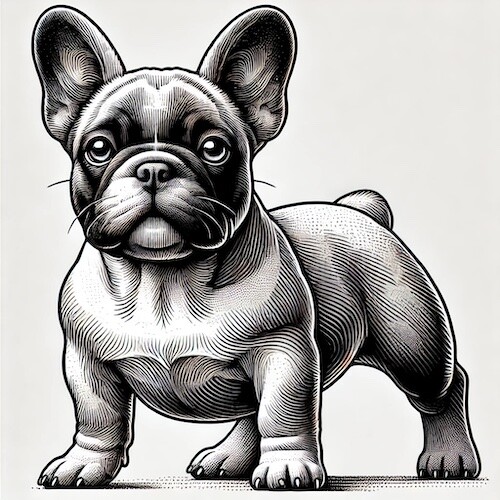
French Bulldog Breed Information: The Complete Guide to Care, Training and Health
Introduction to French Bulldogs
Overview
French Bulldogs, affectionately known as “Frenchies,” hold a special place in the hearts of dog lovers worldwide. Their appeal lies not only in their friendly and affectionate demeanor but also in their unique and charming appearance. Frenchies excel in various roles, from loyal family companions to delightful pets for city dwellers. This ultimate guide delves into every aspect of the breed, providing a thorough understanding of what makes French Bulldogs so unique and beloved.
Search Best French Bulldog Products Online Here
French Bulldogs have consistently ranked as one of the most popular dog breeds in many countries, particularly in urban areas where their small size and adaptability make them ideal pets. Their popularity is a testament to their ability to fit into various lifestyles and living environments. Whether you are considering bringing a Frenchie into your home or are simply interested in learning more about this remarkable breed, this guide will offer valuable insights and practical advice.
History and Origins
The French Bulldog’s journey is as captivating as the breed itself. The origins of French Bulldogs can be traced back to England, where they were originally bred from small Bulldogs, known as Toy Bulldogs, in the 19th century. These small Bulldogs were popular among lace workers in Nottingham, who found them to be excellent companions and efficient at catching rats in the lace mills.
During the Industrial Revolution, many lace workers moved to France in search of better opportunities, bringing their Toy Bulldogs with them. In France, these dogs were crossed with local breeds, including terriers and Pugs, to develop the distinctive French Bulldog we know today. This crossbreeding resulted in a small, muscular dog with unique bat-like ears and a charming, wrinkled face.
French Bulldogs quickly gained popularity in France, particularly in Paris, where they became fashionable companions for society ladies, artists, and writers. Their endearing personality and compact size made them a favorite among the Parisian elite, and their reputation as charming, affectionate companions spread quickly.
Despite their name, “French Bulldog,” the breed has its roots in England and France. Over time, Frenchies gained recognition not only for their suitability as companion animals but also for their distinctive appearance. Their official recognition by major kennel clubs in the early 20th century cemented their status as a distinct and beloved breed.

Physical Characteristics
Size and Weight
French Bulldogs are small, sturdy dogs known for their compact and muscular build. Males typically stand between 11 to 12 inches at the shoulder and weigh between 20 to 28 pounds. Females are slightly smaller, standing between 10 to 11 inches tall and weighing 16 to 24 pounds. This size difference is subtle, but noticeable in well-bred individuals.
Their muscular build and strong frame are complemented by a broad chest and a short, strong back. Frenchies have a distinctive “bat” ear, which is large, erect, and rounded at the top, giving them a unique and endearing appearance. Their expressive eyes and wrinkled faces add to their charm, making them easily recognizable and adored by many.
Coat and Color
French Bulldogs have a short, smooth, and shiny coat that comes in a variety of colors and patterns. The most common colors include fawn, brindle, cream, and pied (white with patches of another color). Fawn Frenchies can range from a light tan to a deep reddish-brown, while brindle Frenchies have a pattern of dark and light stripes. The pied variety features a predominantly white coat with patches of brindle or fawn.
Their coat is relatively low-maintenance and sheds minimally, making them suitable for people who prefer a dog with less grooming needs. Regular brushing helps keep their coat healthy and shiny, and occasional baths are sufficient to maintain their cleanliness.
Lifespan
The average lifespan of a French Bulldog is about 10 to 12 years, but with proper care, some Frenchies can live even longer. Factors such as genetics, diet, exercise, and regular veterinary care all play crucial roles in determining a Frenchie’s longevity.
To ensure a long and healthy life for a French Bulldog, it’s essential to provide a balanced diet tailored to their specific needs, regular exercise to maintain a healthy weight, and routine veterinary check-ups to catch any potential health issues early. Additionally, mental stimulation through training and interactive play can contribute to their overall well-being.
Personality and Temperament
General Temperament
French Bulldogs are celebrated for their friendly and outgoing temperament. They possess a natural eagerness to bond with their owners, making them highly adaptable and loving companions. Their cheerful disposition and moderate energy levels make them an ideal choice for families, individuals, and seniors looking for a loyal and entertaining pet.
Frenchies are known for their patience and gentle nature, traits that make them excellent companions for children. They are typically very tolerant and enjoy participating in family activities, whether it’s playing in the backyard, going on short walks, or simply lounging around the house. This breed thrives on human interaction and craves companionship, making them loyal and affectionate pets.
Interaction with Humans
French Bulldogs have a strong affinity for people and thrive on human interaction. They are known for forming deep bonds with their owners and are often referred to as “velcro dogs” because of their tendency to stick close to their loved ones. This strong bond makes them excellent therapy and companion dogs, as they are naturally inclined to provide comfort and support to those in need.
Their friendly and approachable nature makes them great ambassadors for the breed. Frenchies are often used in community outreach programs, visiting schools, hospitals, and nursing homes to bring joy and companionship to people of all ages. Their calm demeanor and intuitive understanding of human emotions allow them to connect with people on a profound level.
Interaction with Other Animals
French Bulldogs generally get along well with other animals, especially if they are socialized from a young age. Their playful and non-aggressive nature makes them a good fit for multi-pet households. Whether it’s other dogs, cats, or smaller pets, Frenchies tend to adapt well and enjoy the company of other animals.
Proper socialization is key to ensuring that a French Bulldog grows up to be well-adjusted and confident in various situations. Early exposure to different environments, people, and animals can help prevent behavioral issues and promote positive interactions throughout their life. Frenchies’ playful and curious nature often leads them to form strong bonds with other pets, making them a delightful addition to any household.

Training and Obedience
Trainability
French Bulldogs are highly regarded for their intelligence and trainability, despite having a somewhat stubborn streak. Their eagerness to bond with their owners and their desire to please make them receptive to training. Frenchies can excel in basic obedience, agility, and even some dog sports with the right approach and consistency.
Training a French Bulldog can be a rewarding experience, as they quickly pick up on commands and enjoy the mental stimulation that training provides. Consistency, positive reinforcement, and patience are essential when training Frenchies. They respond best to reward-based methods that use treats, praise, and play to reinforce good behavior. Harsh training methods should be avoided, as they can lead to fear and anxiety.
Common Training Techniques
Positive Reinforcement: Positive reinforcement involves rewarding desired behaviors with treats, praise, or toys. This technique encourages Frenchies to repeat the behavior that earns them a reward. For example, rewarding a dog for sitting on command reinforces the action and makes it more likely to be repeated. Consistency in rewarding good behavior helps establish a strong foundation for training.
Clicker Training: Clicker training is a form of positive reinforcement that uses a clicker to mark the exact moment a dog performs the desired behavior. The click is followed by a treat or praise, helping the dog understand which action is being rewarded. Clicker training can be particularly effective for French Bulldogs, as it provides clear communication and immediate feedback.
Obedience Classes: Enrolling in professional obedience classes can provide structured training and socialization opportunities. These classes are beneficial for both puppies and adult dogs, as they teach essential commands and help improve overall behavior. Additionally, obedience classes offer a controlled environment for Frenchies to interact with other dogs and people, enhancing their social skills.
Problem Behaviors and Solutions
While French Bulldogs are generally well-behaved, they can exhibit some problematic behaviors if not properly trained and exercised. Understanding and addressing these behaviors early on is crucial to maintaining a harmonious household.
Chewing: Frenchies, especially during their teething phase as puppies, can be notorious chewers. Providing plenty of chew toys and regular exercise can prevent destructive chewing. It’s important to redirect their chewing behavior to appropriate items and discourage chewing on furniture or personal belongings.
Jumping Up: Jumping up on people is a common issue with Frenchies, particularly when they are excited. Teaching the “sit” command and rewarding calm behavior can curb jumping. Consistently ignoring the dog when they jump and only giving attention when all four paws are on the ground reinforces good manners.
Barking: French Bulldogs can be vocal, especially if they are bored or seeking attention. Addressing excessive barking involves identifying the cause and providing appropriate mental and physical stimulation. Teaching the “quiet” command and rewarding silence can help manage this behavior.
Pulling on Leash: Frenchies are strong and energetic dogs, which can lead to pulling on the leash during walks. Using a no-pull harness and practicing loose-leash walking techniques can help manage this behavior. Teaching the dog to walk beside you and rewarding them for staying close can make walks more enjoyable for both of you.

Health and Wellness
Common Health Issues
French Bulldogs are generally healthy dogs, but they are prone to certain genetic and lifestyle-related health issues. Understanding these potential health problems can help owners take preventative measures and provide the best possible care for their Frenchies.
Brachycephalic Syndrome: Due to their short snouts, French Bulldogs can suffer from brachycephalic syndrome, which affects their breathing. Symptoms can include snoring, labored breathing, and overheating. Ensuring they do not overexert themselves and keeping them cool in hot weather can help manage this condition. In severe cases, surgical intervention may be necessary.
Hip Dysplasia: Hip dysplasia is a genetic condition that affects the hip joints, leading to arthritis and mobility issues. Regular exercise, a healthy diet, and maintaining a healthy weight can help manage this condition. Breeding programs that screen for hip dysplasia can also reduce the prevalence of this issue.
Allergies: French Bulldogs are prone to allergies, which can manifest as skin irritations, itching, and ear infections. Identifying and avoiding allergens, such as certain foods or environmental factors, can help manage allergies. Regular grooming and veterinary care are essential to keep their skin and coat healthy.
Obesity: Frenchies have a strong appetite and can easily become overweight if their diet and exercise are not carefully monitored. Obesity can lead to various health problems, including diabetes, heart disease, and joint issues. Feeding a balanced diet, controlling portions, and ensuring regular exercise are essential to maintaining a healthy weight.
Diet and Nutrition
A balanced diet is essential for maintaining a Frenchie’s health. High-quality commercial dog food that meets their nutritional needs is recommended. French Bulldogs require a diet that is rich in protein, healthy fats, vitamins, and minerals. It’s important to choose a food that is appropriate for their age, size, and activity level.
Read More: Top 10 Best Dry Dog Food Brands
Portion control is crucial to prevent obesity. Frenchies are known for their love of food, and free-feeding can lead to overeating. Measuring their meals and feeding them twice a day can help maintain a healthy weight. Avoid giving table scraps or human food, as this can contribute to weight gain and nutritional imbalances.
Exercise Requirements
French Bulldogs are moderately active dogs that require regular exercise to stay healthy and happy. While they do not need as much exercise as some other breeds, daily walks, playtime, and mental stimulation are important for their well-being. Without sufficient exercise, Frenchies can become bored and develop behavioral issues.
A typical exercise routine for a French Bulldog should include at least 30 minutes to an hour of physical activity each day. This can be broken down into multiple sessions, such as morning and evening walks, playtime in the yard, and interactive games. Providing a variety of activities can keep them engaged and prevent boredom.
Grooming Needs
French Bulldogs have low grooming needs compared to some other breeds, but regular grooming is still important to keep their coat and skin healthy. Brushing once or twice a week helps control shedding and removes loose hair. During seasonal shedding periods, more frequent brushing may be necessary.
Bathing a Frenchie should be done as needed, typically every few months or when they get particularly dirty. Over-bathing can strip the natural oils from their coat, leading to dry skin. Regular ear cleaning, dental care, and nail trimming are also important aspects of grooming that should not be overlooked.
Living with a French Bulldog
Home Environment
French Bulldogs are adaptable dogs that can thrive in various living environments, from apartments to large homes. However, they do best in homes where they have enough space to move around and exercise. While they have moderate exercise needs, they enjoy short walks and playtime to keep them physically and mentally stimulated.
Frenchies are known for their love of being close to their family. They are happiest when they are included in family activities and allowed to be part of the household. Providing them with a comfortable bed or crate in a central area of the home can help them feel secure and connected to their family.
Suitable Activities
French Bulldogs enjoy a variety of activities that engage both their mind and body. Their playful and curious nature makes interactive games particularly enjoyable for them. Providing a range of toys and activities can keep them entertained and mentally stimulated.
Fetch: A classic game that allows Frenchies to burn off energy and engage their playful side. Using soft toys or balls that are easy for them to carry can make the game more enjoyable.
Interactive Toys: Puzzle toys and treat-dispensing toys can provide mental stimulation and keep Frenchies entertained. These toys challenge their problem-solving skills and help prevent boredom.
Short Walks: While French Bulldogs do not require long walks, short daily walks are essential for their physical and mental well-being. Ensuring they are not overexerted, especially in hot weather, is important due to their brachycephalic nature.
Playdates: Socializing with other dogs can be a great way for Frenchies to burn off energy and learn good social behaviors. Playdates with other friendly dogs can provide exercise and mental stimulation.
Family Life
French Bulldogs are known for being excellent family dogs. Their gentle nature and patience make them great companions for children. They are protective without being aggressive, making them good watchdogs. Frenchies are typically very tolerant of children and enjoy playing and interacting with them.
In addition to being great with children, Frenchies often get along well with other pets. Their friendly and non-aggressive nature allows them to coexist peacefully with other dogs, cats, and smaller animals. Proper socialization from a young age can help ensure that they develop positive relationships with other animals in the household.
Frenchies are also known for their loyalty and strong bond with their family. They are happiest when they are included in family activities and allowed to be part of the household. Providing them with plenty of love, attention, and opportunities for play and exercise will ensure that they thrive as a valued member of the family.
Breeding and Puppies
Breeding Practices
Responsible breeding practices are essential for maintaining the health and temperament of French Bulldogs. Prospective breeders should screen for genetic conditions and adhere to breed standards. Breeding should only be done with the goal of improving the breed and producing healthy, well-tempered puppies.
Breeders should conduct health screenings for common genetic conditions, such as brachycephalic syndrome, hip dysplasia, and allergies. Only dogs that pass these screenings should be bred to minimize the risk of passing on genetic disorders to the next generation. Responsible breeding practices also involve providing proper care and socialization for both the puppies and their parents.
In addition to health screenings, breeders should also focus on temperament. Frenchies with friendly, stable temperaments should be chosen for breeding to ensure that the puppies inherit these positive traits. Socialization and early training are also important for developing well-adjusted puppies.
Raising Puppies
Raising a French Bulldog puppy requires time, patience, and consistency. Early socialization and training are crucial for developing a well-adjusted adult dog. Puppies should be exposed to a variety of people, animals, and environments to help them become confident and well-rounded.
Proper nutrition is essential for a puppy’s growth and development. High-quality puppy food that meets their nutritional needs should be provided. Puppies should be fed multiple small meals throughout the day, gradually transitioning to fewer meals as they grow older.
House training and basic obedience training should begin as soon as the puppy arrives home. Consistent routines and positive reinforcement can help puppies learn quickly. It’s important to be patient and gentle, as harsh training methods can cause fear and anxiety.
Choosing a Breeder
When choosing a breeder, it’s important to do thorough research. Look for breeders who prioritize health, temperament, and adherence to breed standards. Reputable breeders will be knowledgeable about the breed and willing to answer any questions you may have.
Visiting the breeder and meeting the puppies’ parents can provide insight into the conditions in which the puppies are raised. The breeder’s facilities should be clean and well-maintained, and the dogs should appear healthy and well-cared for. A responsible breeder will also ask you questions to ensure that their puppies are going to good homes.
In addition to researching breeders, consider adopting from a rescue organization. Many French Bulldogs in need of homes are available through breed-specific rescues and animal shelters. Adopting a dog in need can be a rewarding experience and provide a loving home to a deserving pet.
French Bulldogs in Society
Working Roles
While French Bulldogs are primarily known as companion animals, they can also excel in various working roles due to their intelligence and strong bond with humans. Their charming personality and adaptability make them valuable assets in several professional fields.
Therapy Dogs: French Bulldogs are often used as therapy dogs in hospitals, nursing homes, schools, and disaster response settings. Their calm and friendly demeanor helps provide comfort and emotional support to people in need. Therapy dogs undergo training to ensure they can handle various environments and interactions, making them ideal for providing companionship and reducing stress.
Service Dogs: While less common than some other breeds, French Bulldogs can be trained to assist individuals with certain disabilities. They can perform tasks such as retrieving items, alerting their handlers to sounds, and providing emotional support. Service dogs undergo specialized training tailored to the specific needs of their handlers.
Therapy and Service Dogs
French Bulldogs are commonly used as therapy and service dogs due to their gentle nature and ability to connect with people. They provide emotional support, assist with mobility, and perform various tasks for individuals with disabilities.
Therapy Dogs: Frenchies are often used as therapy dogs in hospitals, nursing homes, schools, and disaster response settings. Their calm and friendly demeanor helps provide comfort and emotional support to people in need. Therapy dogs undergo training to ensure they can handle various environments and interactions.
Service Dogs: French Bulldogs can be trained to assist individuals with physical disabilities, hearing impairments, and other conditions. They perform tasks such as retrieving items, opening doors, and alerting their handlers to sounds. Service dogs undergo specialized training tailored to the specific needs of their handlers.
Popular Culture and Media
French Bulldogs have made numerous appearances in popular culture, from movies and TV shows to books and advertisements. Their friendly and relatable image makes them a favorite in media representations of dogs.
Movies and TV Shows: Frenchies have been featured in many films and television series, often portraying loyal and entertaining characters. Notable examples include “Due Date,” where a French Bulldog plays a memorable role, and “Modern Family,” where a Frenchie is a beloved pet. Their presence in these stories highlights their versatility and enduring appeal.
Books: French Bulldogs have also been the focus of several books, both fictional and non-fictional. Titles such as “French Bulldog: The Frenchie Owner’s Guide” provide valuable insights into the breed, showcasing their deep bond with humans and their significant role in our lives.
Advertisements: Frenchies are frequently used in advertisements due to their approachable and trustworthy image. They are often seen in commercials for pet products, fashion brands, and lifestyle goods. Their distinctive appearance and charming personality make them appealing ambassadors for a wide range of products.

Frequently Asked Questions
- Are French Bulldogs good with children? Yes, French Bulldogs are known for their gentle and patient nature, making them excellent companions for children. They are tolerant and enjoy playing and interacting with kids, making them a popular choice for families.
- How much exercise does a French Bulldog need? French Bulldogs require moderate exercise to keep them healthy and happy. Daily walks, playtime, and interactive games are sufficient to meet their exercise needs. Providing regular exercise helps prevent behavioral issues and keeps them physically fit.
- Do French Bulldogs shed a lot? French Bulldogs shed minimally compared to some other breeds. Regular brushing can help manage shedding and keep their coat healthy. Providing a balanced diet and ensuring they are not experiencing any underlying health issues can also help control excessive shedding.
- Are French Bulldogs easy to train? Yes, their intelligence and eagerness to please make French Bulldogs highly trainable. They respond well to positive reinforcement techniques and enjoy learning new commands and tricks. Consistent training from an early age can help develop good behavior and manners.
- What is the best diet for a French Bulldog? A balanced diet with high-quality commercial dog food that meets their nutritional needs is recommended. Frenchies require a diet rich in protein, healthy fats, vitamins, and minerals. Portion control is crucial to prevent obesity, and feeding them twice a day can help maintain a healthy weight.
- What are common health issues in French Bulldogs? Common health issues in French Bulldogs include brachycephalic syndrome, hip dysplasia, allergies, and obesity. Regular veterinary check-ups, a balanced diet, and maintaining a healthy weight can help manage and prevent these issues.
- How often should I groom my French Bulldog? French Bulldogs have low grooming needs but should be brushed once or twice a week to control shedding and keep their coat healthy. Regular ear cleaning, dental care, and nail trimming are also important aspects of grooming that should not be overlooked.
- Do French Bulldogs get along with other pets? Yes, French Bulldogs generally get along well with other pets, especially if they are socialized from a young age. Their friendly and non-aggressive nature makes them a good fit for multi-pet households.
- Are French Bulldogs good watchdogs? While French Bulldogs are protective of their family, they are not typically aggressive and do not make the best watchdogs. They are more likely to greet strangers with a wagging tail than to act as a deterrent. However, their loyalty and alertness can still make them good companions in a home security context.
- How can I find a reputable French Bulldog breeder? To find a reputable breeder, it’s important to do thorough research. Look for breeders who prioritize health, temperament, and adherence to breed standards. Visiting the breeder, meeting the puppies’ parents, and asking for health clearances can provide insight into the breeder’s practices and the conditions in which the puppies are raised.
Conclusion
French Bulldogs are beloved for their friendly temperament, intelligence, and adaptability. Whether as a family pet, a therapy dog, or a loyal companion, they excel in a variety of roles. Proper care, training, and attention to their health needs ensure that they live happy and fulfilling lives. This guide aims to provide a comprehensive overview of everything you need to know about French Bulldogs, helping prospective and current owners alike appreciate and care for these wonderful dogs.
Their history as charming companions, combined with their modern-day roles in therapy and service, showcases the breed’s enduring appeal and adaptability. By understanding their needs, temperament, and potential health issues, owners can provide the best possible care for their Frenchies, ensuring they thrive in any environment. Whether you’re welcoming a new French Bulldog puppy into your home or seeking to learn more about this remarkable breed, this guide offers valuable insights and practical advice to help you along the way.
